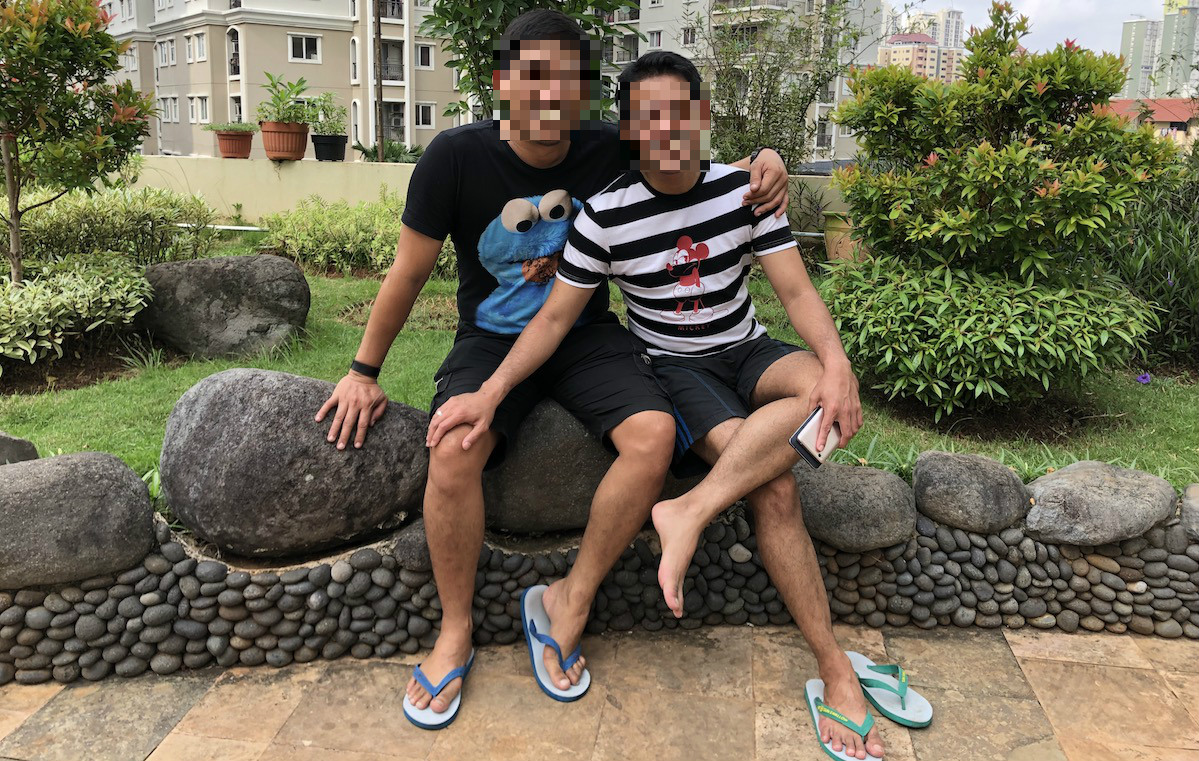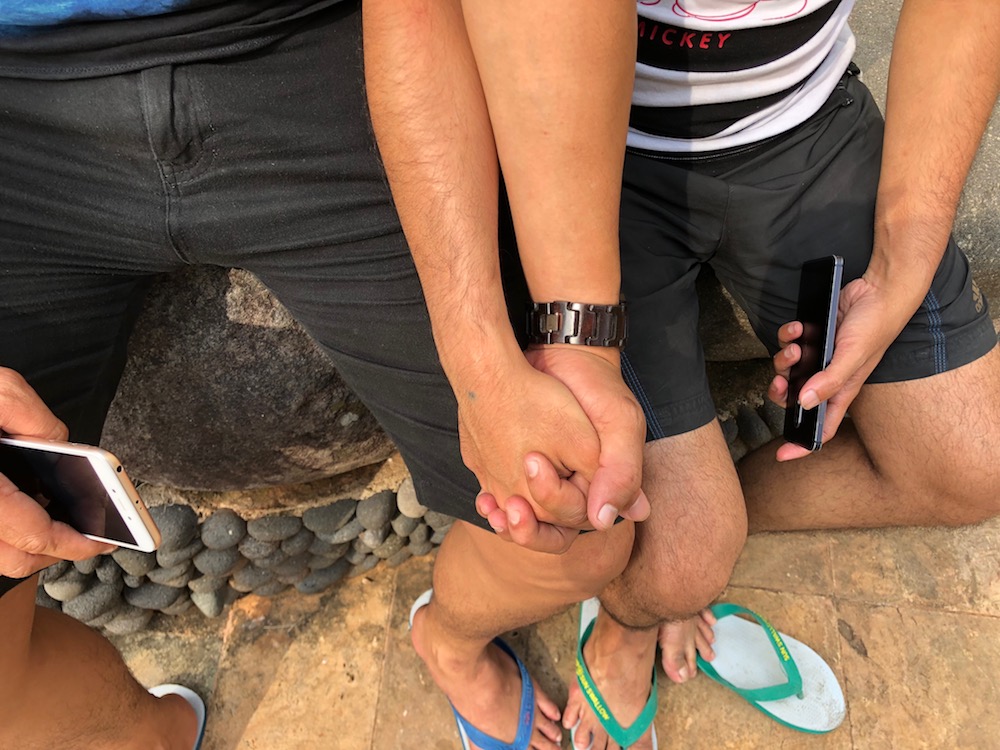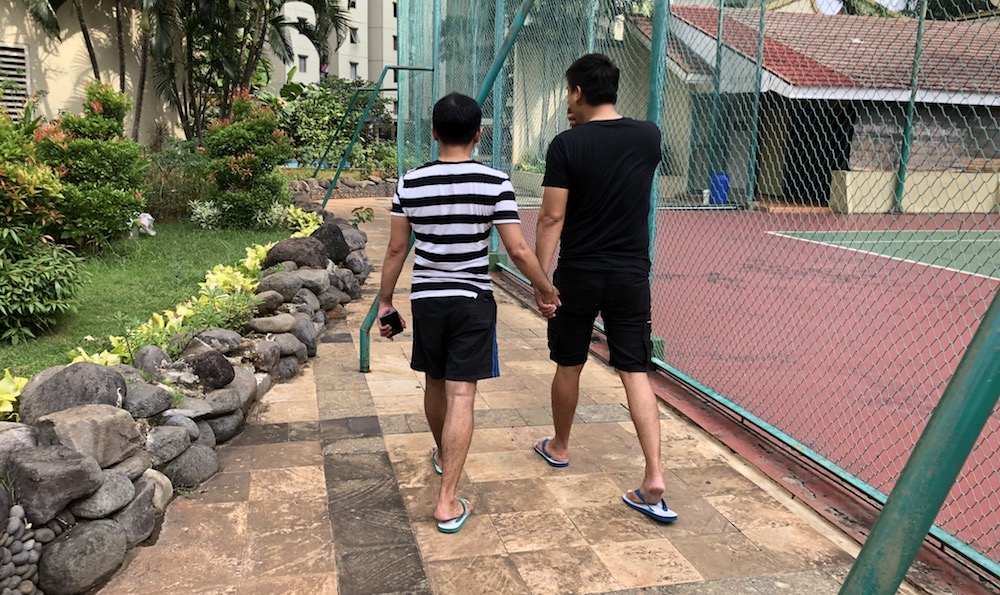Papa*, like any married person with good sense, has made it a point to learn the intricacies of pleasing his in-laws.
“Mom loves flattery, handsome tall men (not unlike himself) and gifts like fruit. So whenever we go to visit, whether the stay is short or long, it’s best if we bring gifts for mom,” Papa says.
“Dad loves to be listened to over cigarettes and coffee. So it’s best to make time to hang out with dad for hours as he talks about his past, politics, etc.”
His relationship with Ayah*, his “husband,” is, of course, unrecognized by Indonesia’s government and its courts, but among families, friends and neighbors, it’s as real a relationship as any other.
In a country where so-called moral panic directed at the LGBTQ+ community is once again on the rise and headlines about lesbians being hosed down by local authorities and pushes to criminalize gay sex are proliferating, their relationship is remarkable precisely for how unremarkable it feels — even if they still occasionally wonder at their good fortune.
“It’s like I’m still in disbelief that my family accepted him,” Ayah says.
Before love
Neither of the two men we met in their Central Jakarta apartment could have envisioned living their lives this openly even 10 years ago.
Like young people of any sexual orientation, much of their 20s and early 30s was spent fumbling through a series of relationships — albeit often in the shadows, forced into clandestine encounters with closeted partners.
Ayah’s formative years were a struggle. While his parents seemed to accept that he was “different,” he was routinely called banci (a derogatory Indonesian term for transgender men) by other children.
Afraid to act on his desire for men, Ayah instead channeled his energy into religion, eventually joining up with a radical Islamist group in his youth, one that would later be connected to terrorist acts.
When he finally broke away from what he describes as the “brainwashing” of the ultra-religious sect and began to explore his true self, his experiences on the dating scene were fraught. He even briefly experimented with dating the opposite sex, including what he described as a “puppy love” relationship with a woman in college that ended in heartbreak.
All too often, he found himself with married men who were living a strained double existence.
“During the Lebaran holiday, mom and dad fought over who gets to share the room with Papa. They’re not like that with the other in-laws. Papa is given all the attention. The other in-laws can get jealous and ask him how he is able to get so close to mom and dad.”
Papa, now 39, knew from an early age that he was gay. But it wasn’t until he enrolled at an exclusive Catholic high school after becoming orphaned at 14, that he fully came to grips with his sexuality in a fashion that “fraught” doesn’t begin to cover — a relationship with a priest.
While keenly aware of the scandal and condemnation that continues to swirl around the Catholic Church’s handling of devastating revelations of sexual abuse of young parishioners, Papa refuses to see the encounter in that light, insisting it was he who initiated the relationship. The resultant scandal at the small school saw the relationship abruptly ended and the priest involved quietly sent to another diocese.
After graduation, Papa entered into a long-term relationship with a man who promised financial security, then ultimately abandoned him and walked away with his money. At rock bottom, even his own siblings largely turned their backs on him.
Fateful right swipe
Papa and Aya found each other as many gay men in Indonesia and elsewhere do, on a dating app. But, for Papa at least, it was clear almost from the moment he “swiped right” that something unusual was happening.
“[When] Ayah added me, he communicated in the most respectful of ways. He didn’t discuss sex. I thought, ‘this guy is different.’ He didn’t even ask for sexy photos,” Papa says.
The two exchanged numbers and kept in touch, but it would be weeks before they finally agreed to meet at a café in a mall in Surabaya, the capital of East Java.
“He wore black pants and a black shirt and I was immediately smitten. He looked like his Grindr photo, which is a lot more than I can say about most guys,” Papa says, Ayah sitting smiling next to him. “He was so nervous … but then we chatted until the mall closed and not once did we discuss sex. I thought, ‘is Ayah not attracted to me?’”
The next day, Ayah invited Papa to his house, but not for the reasons he’d imagined.
“I thought he wanted to make love. It turned out his mom and dad were at home. I was shocked, because I thought Ayah was closeted. Mom and dad were welcoming, they showed me family photo albums, family videos. Our second date was with Ayah’s family,” Papa says with a laugh.
In truth, very few knew of Ayah’s sexual orientation before that atypical first date. Something about Papa, however, made him comfortable enough to be who he really is, at least in front of the people he loves.
“Mom and dad took a liking to Papa immediately. We became a couple after my mom said, ‘Go on, you should be with him,’” Ayah said.
That was in July 2016, and they haven’t looked back.

The favorite ‘in-law’
Papa has become extremely close to Ayah’s family in the 2 1/2 years since their first date — even Ayah’s religiously devout older brother, who has never explicitly acknowledged their homosexual relationship but gets along with Papa as if they were brothers.
Ayah says Papa has become his parents’ favorite “in-law,” with mom introducing Papa as “my son” at extended family gatherings or weddings, a necessary step to circumvent potentially nosy questions about his relationship with Ayah.
“During the Lebaran holiday, mom and dad fought over who gets to share the room with Papa. They’re not like that with the other in-laws. Papa is given all the attention. The other in-laws can get jealous and ask him how he is able to get so close to mom and dad,” Ayah said.
And Papa, deprived of parental figures for most of his life, loves the attention.
While the family’s fondness for Papa is palpable and there has been no effort to disguise what is clearly a loving union, Ayah admits he’s still never explicitly discussed the relationship with his parents or brothers, likening the situation to a “don’t ask, don’t tell policy.”
All he knows is they are happy because he is happy, and that the family puts each other’s happiness above everything else.
Papa has his own theory as to why tolerance runs in Ayah’s family. He says that while Ayah’s family is Muslim (his mother even wears the hijab), they are all well-educated and well-traveled — traits he believes are common among those who have accepted him for who he is.
While Indonesia-specific research on the subject is thin, other international studies have indeed shown a strong correlation between education and tolerance.
More recently, Papa has begun the slow process of reconciliation with his own siblings, a process aided in no small part by Ayah, who stepped in to help his niece financially when she moved to Jakarta for college.
Papa’s sister told him they were sorry for abandoning him when he was in need all those years ago, insisting it wasn’t because Papa was gay, but rather because they didn’t approve of his ex.
Now, they say, they’re willing to accept Ayah, because he has brought happiness to Papa.
A welcoming neighborhood
The couple’s Central Jakarta neighborhood, a bustling mix of high-rises and humble shops and restaurants, is the most welcoming they have ever lived in, they say. In the two months they’ve lived there, Papa and Ayah say they’ve not once been the subject of a gay slur.
As the couple mingled with their neighbors during our visit, they were warmly greeted by other residents, including several small children. One 6-year-old leapt into Papa’s arms and the two took joy in some play fighting — Papa tickling the boy as they both laughed.
As the kids begged for Papa and Ayah to go for a swim in the building’s pool later that afternoon, the boy’s mother said the apartments’ residents have no qualms about their children playing with the couple, something that — unfortunately — bears mentioning given how often homosexuality is equated with pedophilia in Indonesia.
“Why should their sexual orientation determine their personalities? What we know is that they are wonderful people and there’s no reason at all to be scared of them,” said the boy’s mother, a neighborhood chief (RT) in the building.
“My son loves playing with them, and I don’t want to teach him hatred.”
“If one can be out to the family and accepted, or can stay away from the toxicity of a bigoted family, then things are possible.”
As if on cue, Papa slips into parenting mode as we chat, noticing the boy eating instant noodles and politely reminding his mother that it’s unhealthy.
“I saw him eat instant noodles yesterday, too. It doesn’t matter if you take out the seasoning, it’s the noodles themselves that are harmful,” he tells her, advice she accepts with a good-natured laugh.
Practically married
While interpersonal relationships are tough enough, navigating the nut and bolts of coupledom from a legal standpoint in Indonesia carries its own unique set of challenges.
As a banker, Ayah has brought financial stability to their domestic bliss. But to ensure they can care for each other as any other married couple would, they’ve needed to devise ways to circumnavigate a bureaucracy that makes no room, for instance, for gay men to inherit the assets of a partner. Papa being an insurance agent helps in that regard.
The very home they live in is another example of creative problem solving. When Papa had to relocate to Jakarta for work in December, the couple decided to buy an apartment. As co-ownership of property by two gay men is not possible in Indonesia, they were forced to get imaginative — putting the mortgage under Ayah’s name and the property certificate under Papa’s. The latter is backed up by a notarized letter ensuring that Ayah will inherit the apartment in the event of Papa’s death.
It’s the sort of day-to-day innovation that’s a necessity living as a gay couple in Indonesia. But while co-habitation and even inheritances are surmountable obstacles, there are aspects of married life that seem out of reach.
Raising children, they say, is something they have a hard time envisioning, even if they were able to legally adopt. Apart from the financial considerations, Papa and Ayah recognize not everybody in the country is as open minded as their family members and neighbors. They wonder aloud if even their own son or daughter would accept their relationship.
“The child may not even want to have two fathers. Since environment plays a huge part in shaping children, the fact that not all can accept us in Indonesia could mean that our hypothetical child might not as well,” Ayah says.
While issues like these clearly weigh on the couple, they’ve shied from becoming politically active, pointing to the mounting persecution against the LGBT community — sometimes in the form of government-sanctioned discrimination — that has been on the rise in recent years.
“Back in [the old] days, in the Suharto era — I’m not saying the New Order was better for everyone compared to now — gays were able to be more expressive. Now we’re scared to go to spas, gay clubs and such because of the persecution and discrimination,” Papa says, adding that they’re also simply “too old.”
“If I were still young and single, I’d probably be more worried about being active given all the anti-LGBT hatred and raids … in recent years,” he says.

It’s a situation that makes voting in the upcoming April election feel like an exercise in futility. For now, Papa and Ayah both expect to abstain, as neither presidential ticket gives them hope for acceptance for the LGBT community.
“It’s like being made to choose to be killed with a gun or poison. What are we to do? We choose neither,” Papa said.
“I used to think that Indonesia needs 50 years to be able to accept the LGBT community. Now, maybe 100 years.”
“I had hope in President Joko Widodo, but not after he picked [Indonesian Ulema Council Chairman] Ma’ruf Amin as his running mate,” Ayah adds.
And so, for now, Papa and Ayah are content to find joy in the bubble of family and friends.
Role-models?
As same-sex unions have no legal recognition in Indonesia, there are no census numbers telling us how many committed, long-term gay couples exist in the country. But are they as rare as they might seem to the Indonesian public?
Dede Oetomo, widely considered the godfather of Indonesia’s gay rights movement and the founder of GAYa Nusantara, the country’s longest-standing gay rights organization, said there are plenty of Papas and Ayahs around — if you know where to look.
“From my own experience over the past 30-odd years, such couples are not as rare as the general public or even gay and lesbian novices think,” Dede said in a recent interview.
“They are not visible — some because they want to be safe, others because they don’t hang out at the typical gay and lesbian venues. But when I came out in the early 1980s, I already came across couples in long-term relationships.”
The acceptance enjoyed by Papa and Ayah, however, is an outlier, he said, and family is the key.
“I think the greatest barrier is the inability to be out. Linked to this is [Indonesian] families’ obsession with having their children get married and form heterosexual families,” Dede said. “If one can be out to the family and accepted, or can stay away from the toxicity of a bigoted family, then things are possible.”
These days, he added, many same-sex couples are not even out to people in their closest circles, which he believes is largely due to family/societal pressure rarther than any well-publicized acts of persecution against the community.
But even amid today’s troubling headlines, the future feels somewhat brighter compared to 30 years ago when Dede first came out, he says, if for no other reason than it’s now easier for LGBT people in Indonesia to find partners, both sexual and romantic.
While both Papa and Ayah agree it’s easier than ever to connect, they hesitate to hold up their own experience as any sort of path for young members of the LGBTQ community. Finding the sort of domestic bliss they’ve come to enjoy, they say, is a tall order.
“We think we lucked out with having such open-minded families,” Ayah says.
“I guess if you find the one, things will work themselves out.”
* Papa and Ayah’s real names, as well as certain details about their lives, have been omitted, at their request, to protect their identities.


